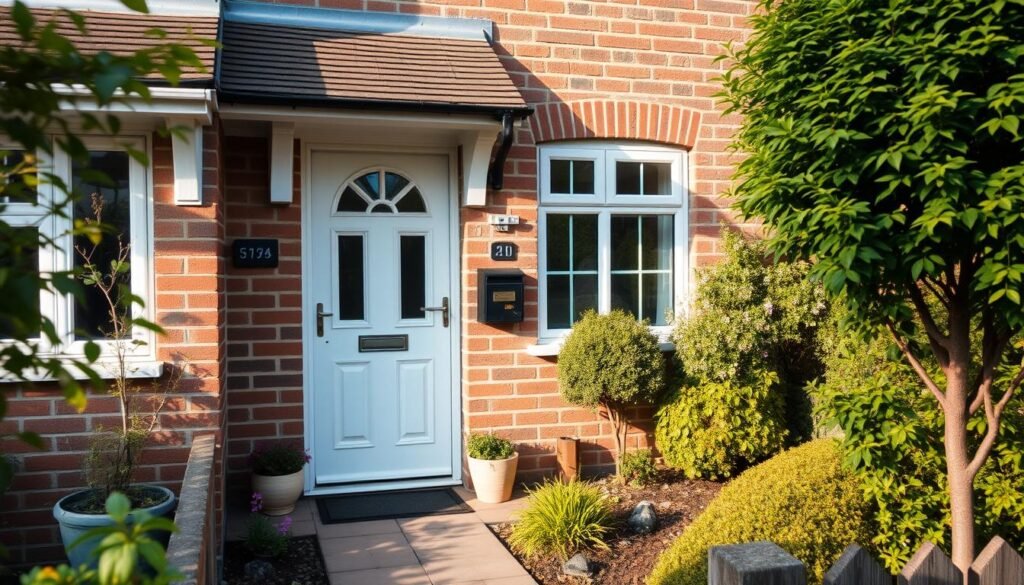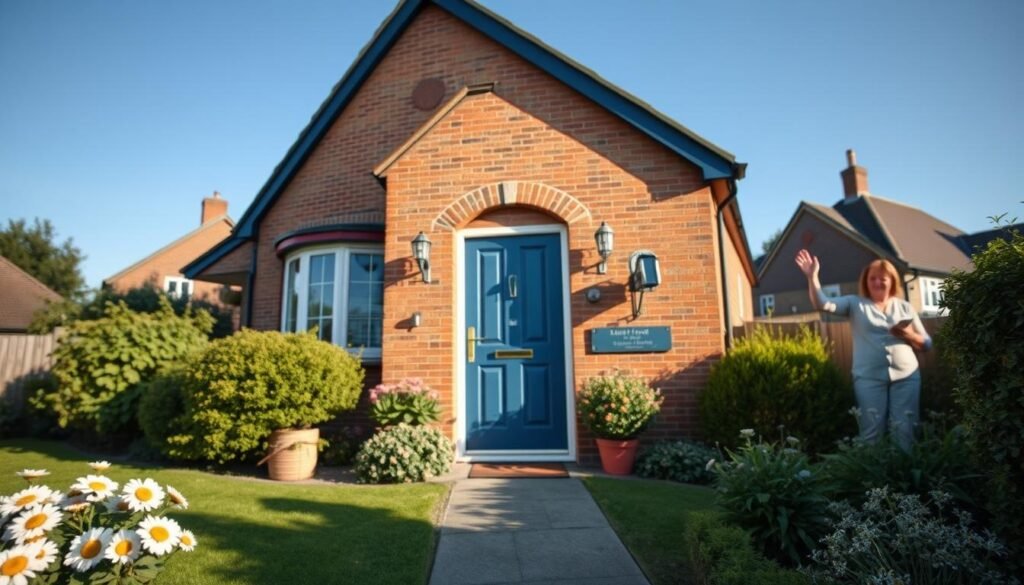Ever found yourself needing to contact your landlord but couldn’t? This is a common problem many tenants face. In the UK, tenants have legal rights to get their landlord’s contact info. Knowing these rights is key to a good relationship with your landlord.
Having your landlord’s contact info is very important. It helps with quick fixes like a leaky tap or a broken boiler. This guide will help you understand your rights to get this info and how to use them.
New housing laws have made it easier for tenants to get information. For example, social housing tenants now have better access to info. This change makes it easier for tenants to ensure their homes are well-maintained and services are good.
Key Takeaways
- Tenants in the UK have legal rights to access their landlord’s contact details
- Landlords are required to provide specific contact information to their tenants
- Recent regulations have enhanced tenant information rights, specially in social housing
- Knowing how to request and obtain landlord details is key for good communication
- Understanding these rights helps keep a positive relationship with your landlord
Understanding Your Legal Right to Landlord Contact Details
In the UK, as a tenant, you have certain rights about your landlord’s contact information. Knowing these rights helps you keep your relationship with your landlord fair and open.
What Information You’re Entitled To
Tenants have the right to get important contact details from their landlords. This includes:
- Landlord’s full name
- Landlord’s address
- Emergency contact number
Also, 100% of UK tenants have the right to live in a safe, decent home that meets health and safety rules.
Legal Framework in the UK
The Landlord and Tenant Act 1985 and the Housing Act 1988 are key for tenant rights in the UK. These laws make sure landlords give tenants the contact details they need. About 90% of private renters have assured shorthold tenancies, which these acts cover.

Timeframes for Information Disclosure
Landlords must give their contact details quickly. For example, they must give a gas safety certificate within 28 days of the inspection. It’s important to know that 75% of landlords give at least 24 hours’ notice before visiting a tenant’s home. Knowing these deadlines helps tenants stand up for their rights.
Tenant Rights to Receive Landlord Contact Details: The Basics
In the UK, tenants have clear rights about getting landlord contact details. These rights help keep the relationship between landlords and tenants fair and open. With 11 million private renters in England affected by new laws, knowing these rights is key.
Landlords must give their full name and address for contact. This info is important for things like fixing issues, emergencies, and official letters. Tenant privacy is protected, making sure this info is used wisely.

Landlords must share tenant contact details when putting the deposit in a government-approved scheme. They have 30 days (28 in Northern Ireland) to do this. Also, all landlords and letting agents must use these schemes for deposits.
Tenants should know that landlords need 24 hours’ notice to visit. The tenant must agree to this. This shows how vital it is to have the right contact info for both sides.
Knowing these basics helps tenants protect their rights and keeps communication clear with landlords. As the rental world changes, it’s important to stay up-to-date on contact details and disclosure rules for a smooth tenancy.
Essential Contact Information Your Landlord Must Provide
Knowing your rights as a tenant is key. The contact details in your lease agreement are very important. Here, we look at the key information your landlord must give you.
Mandatory Contact Details
Your landlord must give you their full name and address. This info is usually in your tenancy agreement. If they live outside the UK, they must give a UK address for notices.
Emergency Contact Information
Landlords should give you emergency contact numbers. This is for urgent situations. Some also ask for pet care contacts if you’re in hospital.
Managing Agent Details
If an agent manages your property, you should know their contact info. This includes their name, address, and phone number.
| Contact Type | Details Required | Purpose |
|---|---|---|
| Landlord | Full name, address | Legal correspondence |
| Emergency | Phone number | Urgent property issues |
| Managing Agent | Name, address, phone | Day-to-day property management |
Remember, the law protects your right to know your landlord’s contact details. They must give this info within 21 days of a written request. Having this info ready helps keep communication smooth during your tenancy.
How to Request Landlord Information Formally
It’s important to get your landlord’s contact details to communicate well. A survey found that 48% of tenants struggle to get this info. To fix this, follow these steps to ask for your landlord’s contact details:
- Write a formal letter or email clearly stating your request for landlord contact details.
- Include your full name, address, and tenancy start date.
- Specify the information you need, such as the landlord’s name, address, and phone number.
- Mention your tenant information rights and cite relevant legislation.
- Set a reasonable deadline for response, typically within 14 days.
Keep a copy of your request for your records. Interestingly, 62% of tenants value having a written record of their information requests. If your landlord doesn’t respond in time, you might need to talk to your local housing authority or get legal advice.
Landlords must give their contact details in 85% of cases, but many don’t. Only 17% include this in rental agreements. By asking for these details, you’re protecting your rights and ensuring you can talk to your landlord easily.
What to Do When Landlord Details Are Withheld
When landlords don’t share their details, tenants have ways to fight for their rights. Knowing these steps helps keep the tenancy fair.
Legal Remedies Available
In the UK, tenants can get their landlord’s contact info. If landlords don’t share, tenants can go to court. The 2016 Data Protection Regulation (GDPR) backs tenants’ right to this data for managing properties.
Contacting Local Housing Authorities
Local councils help with disputes over landlord details. They deal with illegal evictions, harassment, and safety issues. They can get the landlord’s details for tenants.
Seeking Professional Assistance
If talking directly doesn’t work, tenants might need experts. They can contact Citizens Advice or The Property Ombudsman. These groups help tenants get their rights and the landlord’s contact info.
| Action | Timeframe | Next Step |
|---|---|---|
| Request landlord details | Immediate | Wait for response |
| Contact local council | If no response within 2 weeks | File formal complaint |
| Seek professional advice | If council unable to assist | Consider legal action |
Protecting Your Rights During the Information Request Process
Tenants have clear rights about landlord contact and privacy. It’s key to know these rights for a smooth process. Landlords must give out tenant contact details and share important info while keeping privacy in mind.
In the UK, tenants can ask for their personal data through a Subject Access Request (SAR). Landlords must reply within a month. But, if it’s a complex request, they might need two months. Keeping records of all talks is very important.
If you spot mistakes in your data, you can ask for them to be fixed within a month. If your landlord says no, they must explain why. They should also tell you how to complain to the Information Commissioner’s Office (ICO).
| Request Type | Response Time | Tenant Rights |
|---|---|---|
| Subject Access Request | 1 calendar month | Receive personal data copy |
| Data Rectification | 1 calendar month | Correct inaccurate information |
| Property Visits | 24 hours’ notice | Refuse entry without proper notice |
Landlords or letting agents must give 24 hours’ notice for property visits, except in emergencies. This helps protect your privacy. Being well-informed and standing up for yourself is key to a fair relationship with your landlord.
Documentation and Record-Keeping Best Practices
Keeping detailed records is vital for both landlords and tenants. It protects your rights and makes sure all tenancy dealings are clear. This section will cover important practices for keeping good records.
Creating a Paper Trail
Keep a detailed file of all written communications about your tenancy. This includes your lease, landlord contact info, and any requests or replies. The Portsmouth & District Private Landlord’s Association suggests keeping records for at least 14 days for written complaints. It’s also important to keep landlord details easily accessible for tenants.
Digital Record Management
Use digital storage for your tenancy documents. Create a special folder on your computer or cloud storage for easy access. Scan important papers and save emails in this folder. This way, you have backups and can quickly find information when needed.
Important Dates and Deadlines
Mark important dates in your calendar to meet your tenancy duties. For example, landlords must protect deposits within 30 days of receiving them. Also, property inspections need at least 24 hours’ notice. By keeping track of these dates, you follow the law and keep your relationship with your landlord smooth.
| Document | Renewal Frequency |
|---|---|
| Gas Safety Certificate | Annually |
| Energy Performance Certificate (EPC) | Every 10 years |
| Electrical Installation Condition Report | Every 5 years |
Common Challenges and Their Solutions
Getting landlord contact details can be hard. Many tenants struggle to get this important info. Let’s look at some common problems and how to solve them.
One big issue is landlords who don’t reply. If your landlord ignores your requests, write a formal letter. Keep a copy for yourself. If you don’t hear back in 21 days, you can take it to your local council.
Another problem is getting incomplete info. Landlords must give certain details by law. If you only get part of the info, tell your landlord what’s missing. Use your tenant rights to back up your request.
| Challenge | Solution |
|---|---|
| Unresponsive landlord | Send formal written request, escalate to local council if needed |
| Incomplete information | Write to landlord specifying missing details |
| Disputes over right to information | Seek advice from Citizens Advice or housing charity |
If you disagree with your landlord about info, get help. Citizens Advice or a housing charity can offer advice. They can help you understand your rights and what to do next. Knowing your rights is key to getting the info you need.
Conclusion: Securing Your Right to Landlord Information
Knowing your rights to landlord details is key for a fair tenancy. We’ve looked at the laws that let you access important landlord info. This right is not just helpful; it’s a basic part of renting.
The UK government is working hard to make social housing better. They’re setting rules for private landlords to follow. For example, they expect landlords to spend about £16.7 million to meet new information rules.
Landlords must give you important documents like Gas Safety Certificates and Energy Performance Certificates. They also have to protect your deposit in a government-approved scheme. If you’re having trouble getting this info, you can get help from Citizens Advice or your local housing authority.
Being informed and active about your rights helps make the rental market clearer. As laws change, keep up with your rights and duties. This ensures a safe and fair place to live.




